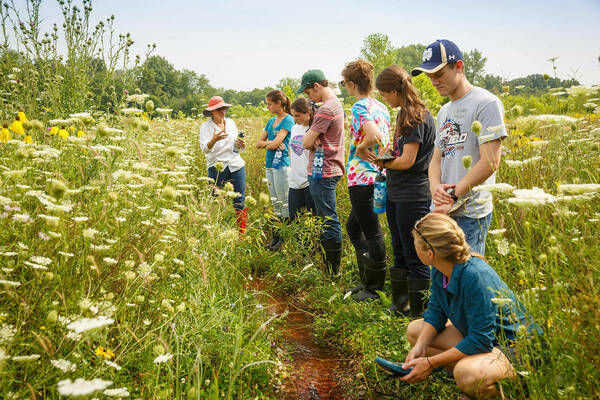
If you have an interest in ecology and want to learn about the ways in which humans interact with the natural world, a major in environmental sciences may be for you.
Environmental sciences majors at Notre Dame take a wide variety of science and non-science-related courses. They have a lot of room to study and explore the topics that interest them.
Take it from the four environmental sciences majors below. They tell us what they love about the major, why they chose it, and about some of the unique opportunities for research and independent study.
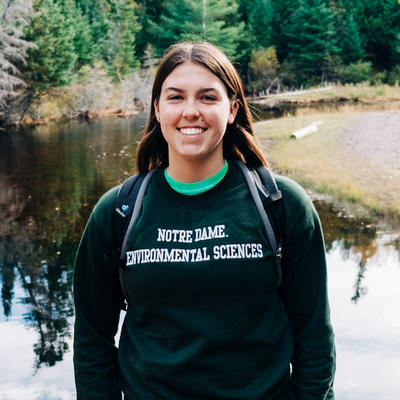
Sydney Harris '24
Major: Environmental Sciences
Minor: Energy Studies
Why did you choose to major in environmental sciences?
I chose to study environmental science (ES) because of my love for nature. Science has always been fascinating to me, and I knew I wanted to explore the environment through a scientific lens. The ES major at Notre Dame allows me to connect my passion to what I hope my contribution to the world will be. It is preparing me for a meaningful career. The major has a great community that is collaborative and encourages academic exploration and welcomes diversity. Overall, ES gives me a lot of academic freedom and amazing opportunities like field trips, research, and studying abroad.
Were you always interested in topics related to this major?
I have always had a love for the outdoors. My family always made sure to get outside when I was younger, which really sparked my passion for nature and adventure. Growing up in California and seeing the direct effects of climate change during my childhood has been heartbreaking and only made my desire to study environmental science stronger. The effects of devastating drought, wildfire, and invasive species like the mountain pine beetle allow me to understand how our world is changing in our lifetime.
So far, what has been your favorite class in the program and why?
My favorite class I have taken in the program has been general ecology, taught by Professor Rocha. I really enjoyed diving deeper into ecology concepts that I learned about in freshman biology. Additionally, the class discusses a lot of really interesting topics that I never had thought about before. It opened my eyes to many disciplines of ecology and is great preparation for higher level environmental science classes. Professor Rocha makes the class engaging and focuses on the importance of knowing ecological concepts. Planet Earth with Dr. Simonetti (in the CEEES—Civil and Environmental Engineering and Earth Sciences—department) is also an awesome class!
Have you conducted any related research or independent study?
I work under Dr. Adrian Rocha in his lab studying arctic tree rings. We are exploring the effects of wildfires in Alaska through analyzing vegetation recovery. We are using multiple decades worth of data of tree rings and climate measurements to characterize tree growth under certain environmental conditions and in recovery areas. My job consists of processing the tree samples, using software to evaluate the tree rings, and attending weekly research meetings with the rest of the team. It has been an amazing experience so far!
What makes the environmental sciences program at Notre Dame stand out among programs like it at other schools?
Environmental science at Notre Dame is a very tight-knit community. Because we are a relatively small major, I am very close to most of my classmates and I have gotten to know my advisor well. I have taken classes taught by my research PI and my advisor. The faculty are all amazing and genuinely want to get to know students. We have really fun events, like catered dinners, activity groups to get to know fellow ES majors with similar interests, and even a formal with the biology majors. There is also a strong mentorship between upper- and underclassman ES majors. Also, we have amazing opportunities to study abroad and have a lot of flexibility in our classes.
Do you have any advice for prospective students who are considering a major in environmental sciences?
It is the best major! I love being an ES major and getting the chance to study what I love. If you are interested in science and passionate about the outdoors, nature, and climate change, you will love being an ES major. It is a super flexible major, so you have the chance to really explore your interests. We have awesome field trips and study abroad opportunities where you can study science all over the country and world!
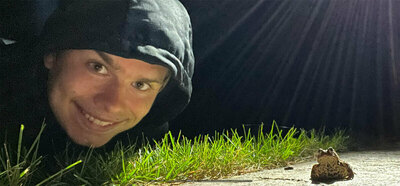
Sam Bosio '22
Major: Environmental Sciences
Minor: Sustainability
Why did you choose to major in environmental sciences?
I have always been fascinated with the natural world for its beauty, dynamism, and patterns we can identify through research. Our environment is both necessary for our wellbeing and in serious danger, which adds social and cultural components that make it intriguing to study. I also enjoy the diversity of careers environmental science prepares students for, all of which afford opportunities to directly help people.
Were you always interested in topics related to this major?
Since I was young, I knew I wanted to study biology out of pure curiosity. Growing up in Montana, I became interested in how to restore rivers and lands that we rely on for their natural resources, but have been degraded by human activity. Throughout high school and college, as I learned more about environmental change and the role of politics and socioeconomic structures in environmental change, I grew more of an appreciation for the complexity of issues in environmental science.
So far, what has been your favorite class in the program and why?
The ten-week Practicum in Field Biology course that takes place over the summer in Notre Dame’s research station in Wisconsin was an amazing way to learn how to conduct real life science. The setting is incredible, with pristine lakes and dense forests where we experienced everything from mammal ecology to forestry.
Have you conducted any related research or independent study?
I have done undergraduate research in the Lamberti Lab since my first summer in college. I was fortunate to work on a variety of projects in stream restoration, wetland monitoring, and environmental toxicology in salmon. My duties involved field and labwork, data analysis, and writing, and working under Dr. Lamberti and his graduate students have taught me so much about how to be a scientist, communicator, and collaborator. During quarantine, I had to get creative. At home I volunteered for a local land trust, then connections my professors have helped me find a volunteer research role at a biological station in Montana. Never be afraid to ask to be introduced to someone or ask an organization if they need assistance on a project.
What makes the environmental sciences program at Notre Dame stand out among programs like it at other schools?
The access to meaningful research opportunities at Notre Dame is exceptional. Not only are all professors excited to help undergraduates conduct projects with self-driven components, but there is ample funding for independent research and collaborative projects related to any aspect of environmental science. The environmental science faculty also makes it a priority to provide career development resources for students interested in research, consulting, academia, education, and other careers.
Do you have any advice for prospective students who are considering a major in environmental sciences?
Having conversations with faculty early is a great way to learn how you can take advantage of your college experience and identify potential career paths. They are experienced, well-connected, and want to help. I also suggest trying some clubs and attending events you might be interested in that aren’t strongly related to environmental science. College is full of experiences you won’t get a second chance at, and you will learn how to apply your knowledge of the environment to improve people’s lives in new and exciting ways.
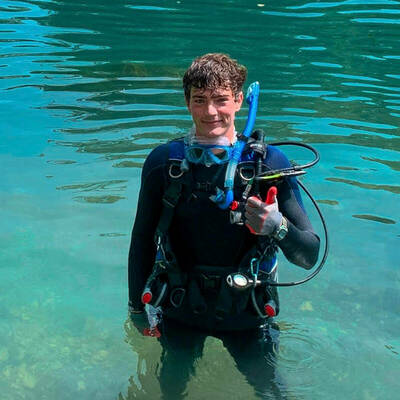
Jonathan Gilman '23
Major: Environmental Sciences
Minor: Sustainability
Why did you choose to major in environmental sciences?
I chose to major in environmental science because it was the first time in my schooling that I could really narrow down my scope of learning to exactly what I was interested in. I actually started out as a biology major, but my disinterest in medical school and my love of the outdoors quickly led me on a different path. I love the major because it is quite flexible, allowing you to explore topics in a wide variety of fields, including anything from ecology to chemistry to data analysis.
Were you always interested in topics related to this major?
Growing up, my mom instilled in me a great curiosity for the natural world. Whether it was snorkeling at the beach, climbing trees, or working in the garden, I loved it all and I loved doing it with her. This directly led to our family adopting many animals, including dogs, cats, chickens, birds, turtles, and bees. My love of animals and the environment only grew, and it is no surprise I ended up where I am today.
So far, what has been your favorite class in the program and why?
So far, my favorite class in the program has been the General Ecology Lab. Taught by Dr. Dominic Chaloner, this course was amazing because it was the first time I was given a chance to freely design and conduct actual experiments in the field from start to finish. This also meant that a significant portion of the class time was spent outside at different forests and parks, including Warren Dunes State Park.
Have you conducted any related research or independent study?
This past semester I began preparing for an independent research project through the Tank Lab, where I have worked for the past two years. In this study, I will seek to understand the effects of several different factors on N2O production, specifically in the context of agricultural practices. I will be utilizing the Notre Dame Linked Experimental Ecosystem Facility (ND-LEEF) and their experimental watersheds to conduct this study.
What makes the environmental sciences program at Notre Dame stand out among programs like it at other schools?
The environmental sciences program here at Notre Dame stands out among programs like it at other schools because of the community we have developed. I know that is such a cliché Notre Dame answer, but it is really true. Our major is a small one, but it means that we all know each other by name and we all care about each other even outside of the classroom. On top of that, we have an outstanding set of renowned faculty members that interact with us on a personal basis every day and that truly care about our development as people, not just students.
Do you have any advice for prospective students who are considering a major in environmental sciences?
For anyone considering majoring in environmental science, just know that it is a lot of fun and there are many possible career paths after graduation! I don’t think you’ll regret choosing to study something you love.
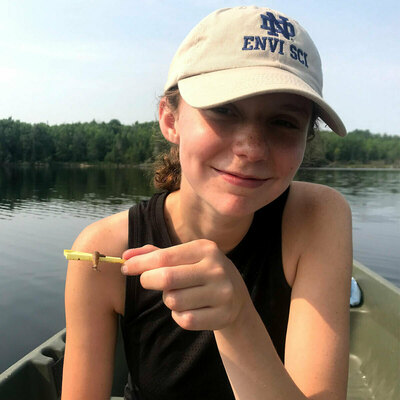
Eva Deegan '23
Major: Environmental Sciences
Why did you choose to major in environmental sciences?
For me, environmental sciences is the perfect combination of all the subjects I enjoy studying including biology, ecology, chemistry, and physics. I’ve also always loved being outside and exploring the natural world, and the fact that I am able to study and better understand the environment around me is really special. I really enjoy being a part of the environmental sciences major at Notre Dame because its a really close-knit group filled with students who also love the outdoors.
Were you always interested in topics related to this major?
Growing up some of my favorite memories were when my dad would take my brothers and I backpacking in the summer as well as spending time at Lake Huron with my grandparents. I loved spending time outside and was always curious about the natural world. I didn’t become very interested in science until later in high school when I had a great biology teacher. I hadn’t taken an environmental sciences class before I got to Notre Dame but I had always been interested in learning about climate change and current environmental issues such as invasive species and biodiversity so I knew I would enjoy learning more.
So far, what has been your favorite class in the program and why?
I really enjoyed General Ecology Lab with Dr. Chaloner because it was the first chance I got to really explore the process of conducting scientific research in ecology. We got to design our own experiments, go out in the field and collect data, run statistics and write scientific reports. The lab includes lots of fun field trips to areas in South Bend and Lake Michigan! The lab helped me realize that I was really interested in research and that I would like to go to graduate school to continue to perform my own research in environmental sciences.
Have you conducted any related research or independent study?
I’ve worked with the Jones lab since the beginning of my sophomore year and it has been one of the best experiences of my time at Notre Dame. My first year I got plenty of experience working in a lab as well as organizing databases. Over the summer I got to work for the Jones lab at UNDERC (University of Notre Dame Environmental Research Center) as a part of the limnology team which involved going to different lakes every day to take samples and measurements. This past semester I started working on an independent study using a climate model to measure lateral carbon transport around the United States. I’ve also learned a lot working alongside the graduate students in the lab as well as from Dr. Jones!
What makes the environmental sciences program at Notre Dame stand out among programs like it at other schools?
I think the environmental sciences program at Notre Dame is really special because it’s a small program so it’s really easy to get to know the other students and professors. The professors really give a lot of attention and advice to students discerning their career paths. We also have lots of events for the major including dinners, socials, and activities together. Notre Dame also has a property in Wisconsin for research, UNDERC, and I really enjoyed working there over the past summer. The environmental sciences major also offers a lot of space for electives and double majors/minors that wouldn’t be possible with other programs. I’ve been able to get all my ES requirements done easily while taking Spanish classes for fun and studying abroad for a semester in Santiago, Chile.
Do you have any advice for prospective students who are considering a major in environmental sciences?
Go for it! The first year will be pretty difficult with requirements such as chemistry, calculus, and biology but sophomore year you really get to start taking interesting classes in ecology, biostatistics, and environmental chemistry. I definitely made use of the resources that Notre Dame has available such as the math help room and tutoring sessions with the learning resource center which helped a lot. I would also encourage students to read the environmental sciences newsletter for events and activities because you can make friends in the major and have a network of support for classes! I have loved my time as an environmental sciences major and I truly recommend it to anyone interested in science and learning more about the natural world.

Learn More
Explore environmental sciences at Notre Dame.
Learn about all majors in Notre Dame's College of Science.
Check out the minors in the College of Science.
Originally published by at admissions.nd.edu on March 29, 2022.